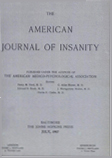AN INTERPRETATIVE STUDY OF INVOLUTIONAL DEPRESSION
Abstract
A study of the productions of four cases of depression, three of involutional melancholia and one in the involutional period with a seventh attack of manic-depressive psychosis is reported here. These productions seem to indicate that the following mechanism produces the attack of depression. A precipitating situation arises in the patient's life whereby his ego receives a wound and the carefully built up compensations over many years fail. This precipitating situation reactivates a similar childhood situation and causes a regression of the libido to a more infantile level—one of oral eroticism. At this level the differentiation between subject and object is vague. The object seems to have signified the ego ideal—the inhibitions—and this projection of the ego ideal on the object seems to have made it possible for the ego to incorporate it (devour it) into a subordinate position where the hate element in the libido strivings can be vented on it. The patient flees from the precipitating situation into the psychosis and in the psychosis can give full play to his infantile hate against the object, his ego ideal and his inhibitions, but by doing this he increases his guilt which he is able to satisfy by punishing his ego for its subordination of the ego ideal.
Access content
To read the fulltext, please use one of the options below to sign in or purchase access.- Personal login
- Institutional Login
- Sign in via OpenAthens
- Register for access
-
Please login/register if you wish to pair your device and check access availability.
Not a subscriber?
PsychiatryOnline subscription options offer access to the DSM-5 library, books, journals, CME, and patient resources. This all-in-one virtual library provides psychiatrists and mental health professionals with key resources for diagnosis, treatment, research, and professional development.
Need more help? PsychiatryOnline Customer Service may be reached by emailing [email protected] or by calling 800-368-5777 (in the U.S.) or 703-907-7322 (outside the U.S.).



